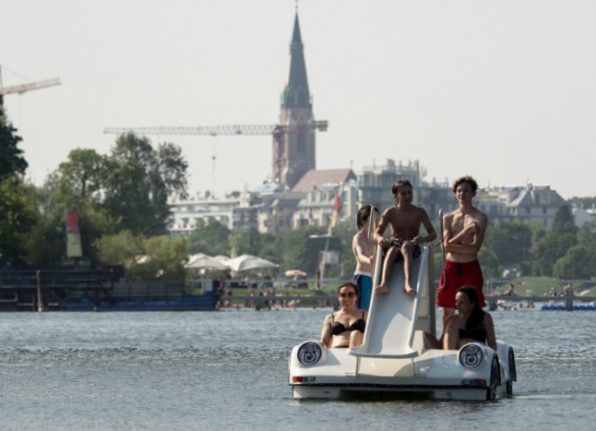Austria is a very popular tourist destination, especially during the summer months, with its pristine lakes and beautiful cities ready to receive thousands of travellers.
However, the pandemic is still not over and many tourists are left with several questions when they decide to visit another country.
Here is what you need to know about the Covid-19 situation, rules, and requirements before visiting the Alpine country.
What are the entry rules?
First of all, what are the rules for entering the country? That’s an easy one: there are currently no Covid-19 restrictions for entering the country.
More specifically: there is no need to show proof that you were recently vaccinated, recovered from Covid-19 or tested negative for the disease.
You also don’t need to quarantine upon entry or fill in a specific online form.
This could change on short notice, though, in case any variant of concern is found in Europe or further afield.
Here is the official website where you can find more information in English.
Are there any Covid-19 restrictions?
Austria has lifted most of its coronavirus-related restrictions, and life is almost as it was over two years ago. However, there are still a few rules to keep in mind, especially concerning masks.
There are also some differences when it comes to Vienna and the rest of the country, as Mayor Michael Ludwig (SPÖ) chose to stick with the “Viennese way” and keep some restrictions, most notably the mandatory use of masks in public transport.
Currently, masks are no longer mandatory in essential stores or public transport in most of Austria.
READ ALSO: LATEST: These are the Covid rules in Austria and Vienna from June 2022
According to the federal government, there is still an FFP2 mask mandate in “vulnerable” settings. These include hospitals, elderly and care homes, and health services.
Vienna has a few more restrictions when it comes to using of masks. In the capital, they are still mandatory in pharmacies, health care, and public transport (including the stations).
Besides the mandatory FFP2 mask usage in the entire country, Vienna also has a PCR test obligation to visitors. There are no longer visitor restrictions, though.
Self-isolation rules: what if I test positive?
In Vienna, the quarantine after a positive test lasts for ten days. It ends automatically if, during the last 48 hours, the person has shown no symptoms. People can test themselves free after five days if the PCR result is negative or a CT value above 30.
In the rest of Austria, people who tested positive but had a mild course of the disease and showed no symptoms for 48 hours can leave quarantine on the fifth day of isolation.
READ ALSO: What tourists in Austria should do if they test positive for Covid
If they test negative, they are free from restrictions.
Still, if they do not get tested or get a CT value below or equal to 30, they go into “traffic restriction” and need to wear a mask and not visit events or gastronomy for the next five days.
Can I take a free Covid-19 test as a tourist? What about a free vaccination?
Technically, yes. With the tests, it can be a bit more complicated, but we wrote a complete guide on how to get free Covid tests in Austria as a tourist.
READ ALSO: How tourists, visitors (and residents) can get free Covid tests
There are still “test streets” and “test boxes” where you can get tested for free without having an Austrian social insurance number. Remember to carry a picture ID and wear an FFP2 mask in those places, though.
As for vaccination, it is also possible to get a Covid-19 vaccine for free and without Austrian health insurance in the country. You will also need a picture ID and to wear a mask.
What if I get Covid-19 before my trip to Austria?
You are not allowed to enter Austria if you know you have Covid-19 – though there are currently no more checks, this falls largely into personal responsibility.
If you need to cancel your trip due to a positive test result, here is what you need to know about your rights.
READ ALSO: Reader question: Can I get a refund after cancelling my Austria trip due to Covid?
Airline companies are not required to refund you or allow you to make changes to your flight for free – unless the ticket you purchased entitles you to these rights.
The same is valid for hotel reservations. Most of them, primarily if you have used an online booking platform, will have different fees, and travellers have additional rights. It is essential to understand each tariff and what they entitle you to.
What is the current situation regarding Covid-19 in Austria?
Coronavirus numbers are rising in Austria, with many experts alerting to a Covid-19 wave, as The Local reported.
On Monday, July 4th, Austria reported 7,745 new coronavirus infections after 60,917 PCR tests. There were 929 hospitals with Covid-19 and 51 people in intensive care units. Since the beginning of the pandemic, 18,798 people have died from the disease in Austria.
Just under 62 percent of the population has all the necessary vaccination doses for a valid “green pass”, according to the Health Ministry.
READ ALSO: 11,000 new cases: Will Austria reintroduce restrictions as infection numbers rise?



 Please whitelist us to continue reading.
Please whitelist us to continue reading.
Member comments